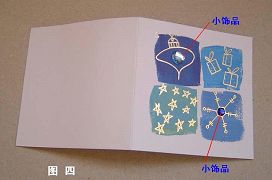(Clearwisdom.net) Bee & Flower (Feng-hua) and Maxam (Mei-jia-jing) are both well known brand labels from Shanghai in China, and their products are sold in southeast Asia as well as all over China. Very few people however know that some of these products, such as the soaps, are processed in Tilanqiao Prison and other jails. The companies behind these prestigious labels are participating in the persecution of Falun Gong practitioners and other prisoners, which is in violation of international laws.
At the gate of Section 2 of the Shanghai Tilanqiao Prison, trucks loaded with soaps and other hygiene products are often seen. They unload unpackaged products and reload with boxes of packed soap. Prisoners are forced to finish the most complicated step of packing Bee & Flower soap bars: gluing on two strips of paper with instructions and a label (1 and 2 in Photo 1) and two trademark stickers (3 and 4 in Photo 1).
 |
For the Bee and Flower products, every prisoner in the "soap group" has to finish the following workload daily: Pack over 70 boxes of large soap bars (72 bars in each box) or pack over 30 boxes of small soap bars (144 bars in each box). Prisoners each have to work from morning to night to finish packing about 5,500 bars of soap. Prisoners also have to fold a piece of paper with information for each bar and to fold small paper boxes to be filled with either four or 12 bars. In order to finish all the work, prisoners give up their break time, which is not much, to fold the papers and the small boxes. For the packages with information in English they also have to glue serial numbers on the soaps.
For the Maxam products, prisoners pack soap bars and liquid soap. They both come in large quantities. (Photo 2)
 |
 |
Since late 2000, the Shanghai Tilanqiao Prison has actively participated in persecuting Falun Gong practitioners who believe in Truthfulness, Compassion, Forbearance. Besides being locked in separate cells, beaten, verbally abused, and brainwashed, practitioners have been forced to work on packing soap. The "soap group" prisoners worked in unequipped but spacious workshops, while Falun Gong practitioners have to work in the hallways outside their cells. For those practitioners being strictly monitored because they were very steadfast, usually the soap bars and packing materials were taken into their cells and they had to work there. The dark prison cells, measuring only 3.3 square meters, became their workshop to pack soap. Most of the practitioners in the prison packed the medical soap as well when it was in high demand in 2003.
 |
Products from other well known Shanghai labels are soaked in prisoners' sweat. For example, the building for Group 3 at the Shanghai Women's Forced Labor Camp is a makeshift workshop for the famous brand Threegun (San-qiang), where Shanghai Falun Gong practitioner Ms. Bai Gendi, who was illegally arrested and detained many times, worked and was persecuted. Group 2 forced the practitioners to work on Daphne (Da-fu-ni) shoes. Practitioners are detained and persecuted by the Chinese Communist Party because they believe in Truthfulness, Compassion, Forbearance. Every day after being forced to work extremely hard for more than 10 hours, they are then subjected to intense brainwashing by prison wardens.
All content published on this website is copyrighted by Minghui.org. Minghui will produce compilations of its online content regularly and on special occasions.









